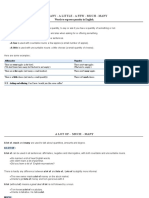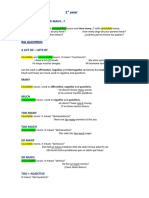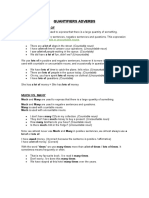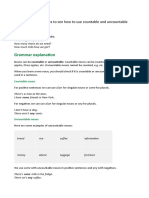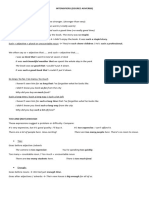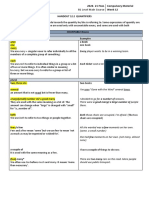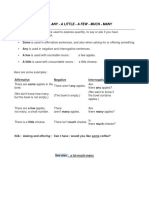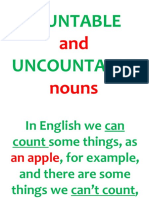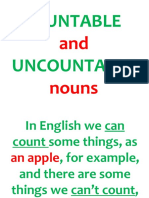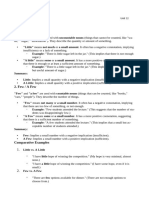0 ratings0% found this document useful (0 votes)
6 viewsLittle
Little
Uploaded by
Huy NguyenCopyright:
© All Rights Reserved
Available Formats
Download as DOCX, PDF, TXT or read online from Scribd
Little
Little
Uploaded by
Huy Nguyen0 ratings0% found this document useful (0 votes)
6 views3 pagesOriginal Title
Little...
Copyright
© © All Rights Reserved
Available Formats
DOCX, PDF, TXT or read online from Scribd
Share this document
Did you find this document useful?
Is this content inappropriate?
Copyright:
© All Rights Reserved
Available Formats
Download as DOCX, PDF, TXT or read online from Scribd
Download as docx, pdf, or txt
0 ratings0% found this document useful (0 votes)
6 views3 pagesLittle
Little
Uploaded by
Huy NguyenCopyright:
© All Rights Reserved
Available Formats
Download as DOCX, PDF, TXT or read online from Scribd
Download as docx, pdf, or txt
You are on page 1of 3
A lot of/lots of
Before both countable and uncountable
We use a lot of or lots of (more informal) before
both plural (countable) and uncountable nouns. We normally use
them in positive sentences.
She spends a lot of time watching TV.
We had lots of good moments together.
Of before noun but NOT at the end of sentence
We must always use a lot of or lots of including of before a noun.
However, we can use the expressions a lot or lots (without of) at the
end of a sentence.
‘How many beers did you have?’ ‘I don’t know; I had lots/a lot.’
I like her a lot.
(A) few/(a) little
Few for countable; little for uncountable
We use (a) few before plural (countable) nouns and (a) little or a bit
of (more informal) before uncountable nouns.
I have to do a few things this afternoon.
He always gets good results with very little effort.
Can you put a bit of sugar in the tea?
Few or a few? little or a little?
A few means ‘some but not many; enough’, and a little means ‘some
but not much; enough’.
Few/little mean ‘almost none; not enough’.
Normally, the difference between a few/little (WITH a)
and few/little (WITHOUT a) is that a few/little is positive in meaning,
and few/little is negative. Compare:
There’s little milk in the fridge; we have to buy more. (Not
enough; we need more)
‘Shall I buy some beers?’ ‘No, it’s OK, there are a few in the
fridge.’ (=Enough; we don’t need more)
‘Do you speak English?’ ‘No, I speak very little
English.’ (=Negative)
‘Do you speak English?’ ‘Yes, I speak a little English.’
(=Positive)
You might also like
- Avance 1 PDFDocument18 pagesAvance 1 PDFEdwin RosasNo ratings yet
- Expression of QuantityDocument5 pagesExpression of Quantityisma_fiNo ratings yet
- Quanti FiersDocument4 pagesQuanti FiersАнђелко СимићNo ratings yet
- Quanti FiersDocument3 pagesQuanti Fierszalogina2505No ratings yet
- QuantifiersDocument4 pagesQuantifiersEriona BreguNo ratings yet
- 1B3 Week 1 C1 Technology - QuantifiersDocument61 pages1B3 Week 1 C1 Technology - QuantifierscesarsmitcusilazoNo ratings yet
- More Quantifiers Before NounsDocument5 pagesMore Quantifiers Before NounsAntonia Vergara MerinoNo ratings yet
- Some, Few, A Few, Little, A LittleDocument9 pagesSome, Few, A Few, Little, A LittleAlina DanNo ratings yet
- ArticleDocument9 pagesArticleEdgard Eduardo Azañero EstradaNo ratings yet
- Countable and Uncountable Nouns: Colombia Exports A Large Amount of Coffee ( I've Oredered Three Coffees ( Countable CupsDocument17 pagesCountable and Uncountable Nouns: Colombia Exports A Large Amount of Coffee ( I've Oredered Three Coffees ( Countable CupsRoberto Pridebailo100% (1)
- Explicacion Articulos The A An Some Many Much A Lot Of...Document3 pagesExplicacion Articulos The A An Some Many Much A Lot Of...arojasvaldez21No ratings yet
- Countable Uncountable Nouns With QuantifiersDocument10 pagesCountable Uncountable Nouns With Quantifierscuencadiego270No ratings yet
- Much, Many, Little, Few, Some, Any - Quantifiers - Test-EnglishDocument1 pageMuch, Many, Little, Few, Some, Any - Quantifiers - Test-EnglishsolomiamaslanikNo ratings yet
- Quantifiers (Countable and Uncountable Nouns)Document16 pagesQuantifiers (Countable and Uncountable Nouns)rafaelbremagNo ratings yet
- Much, Many, A Lot Of, A Little, A Few, No, Any, None - A1 - Master AcademyDocument5 pagesMuch, Many, A Lot Of, A Little, A Few, No, Any, None - A1 - Master AcademyLencastrepessanhaNo ratings yet
- Unco Unta: Any: Is Use in Question and Negative SentencesDocument2 pagesUnco Unta: Any: Is Use in Question and Negative SentencesOccisor RTNo ratings yet
- Quantifiers 1° AñoDocument2 pagesQuantifiers 1° AñoCarmen Alva NamocNo ratings yet
- Reviewof QuantifiersDocument4 pagesReviewof QuantifiersAni CruzNo ratings yet
- QuantifiersDocument3 pagesQuantifiersMaéva Val MacéNo ratings yet
- Quanti FiersDocument5 pagesQuanti Fiers5jqvvwtwq2No ratings yet
- A Lot Of, A Little, A Few, No, Any, NoneDocument7 pagesA Lot Of, A Little, A Few, No, Any, NoneАліна ГуляйгродськаNo ratings yet
- Quantifiers Ninth GradeDocument19 pagesQuantifiers Ninth GradeMarcela AuxNo ratings yet
- Expressions of QuantityDocument13 pagesExpressions of QuantityNatalie DorohavtsevaNo ratings yet
- Pronoun Part 2Document5 pagesPronoun Part 2Dirga RavicoNo ratings yet
- Determ Iners A ND Quant Ifiers: Gcss 2 020Document17 pagesDeterm Iners A ND Quant Ifiers: Gcss 2 020Adriana Sanchez Fuentes100% (1)
- Quantifiers Grammar GuidesDocument13 pagesQuantifiers Grammar GuidesТамара КорягинаNo ratings yet
- 2° - Unit 2 Quantifiers.Document10 pages2° - Unit 2 Quantifiers.Ile CapeNo ratings yet
- Some, Any, No + Other QuantifiersDocument5 pagesSome, Any, No + Other QuantifierslucaNo ratings yet
- 3.2. WH Questions - QuantifiersDocument31 pages3.2. WH Questions - QuantifiersCarolina Paz Olguin QuiñonesNo ratings yet
- Expressions of QuantityDocument2 pagesExpressions of Quantityvitoriadagraca50No ratings yet
- Quite RatherDocument9 pagesQuite RatherMaria GonzalezNo ratings yet
- Support Gram Ang l1 Part 2-1Document17 pagesSupport Gram Ang l1 Part 2-1mbdiop50No ratings yet
- QUANTIFIERSDocument3 pagesQUANTIFIERSMarianna González HernándezNo ratings yet
- Much - Many - Lot - Few - Grammar RulesDocument2 pagesMuch - Many - Lot - Few - Grammar RulesEmma Emily100% (1)
- Much Many A Lot ofDocument3 pagesMuch Many A Lot ofAlex Nikovski100% (1)
- English Life N1 M8Document7 pagesEnglish Life N1 M8Ed SoNo ratings yet
- Countable & Uncountable NounsDocument19 pagesCountable & Uncountable NounsMohammed ElouahalNo ratings yet
- What Are QuantifiersDocument5 pagesWhat Are QuantifiersSilvia MallottiNo ratings yet
- Count - Non Count Nouns Some - Any How Much - How ManyDocument13 pagesCount - Non Count Nouns Some - Any How Much - How ManySandra JimenezNo ratings yet
- Quantifiers Grammar Guides - 124122Document32 pagesQuantifiers Grammar Guides - 124122Maryna OryshchenkoNo ratings yet
- Quantifiers-A2Document3 pagesQuantifiers-A2linaNo ratings yet
- nouns, plurals, quantifiersDocument1 pagenouns, plurals, quantifiersIonela PopaNo ratings yet
- IntensifiersDocument6 pagesIntensifiersJuan Pablo Luna ValdesNo ratings yet
- Exercise (Quantifiers)Document3 pagesExercise (Quantifiers)trongbmse183686No ratings yet
- MuchDocument17 pagesMuchdaniloNo ratings yet
- Quanti FiersDocument21 pagesQuanti FiersKristina RadikovnaNo ratings yet
- Handout 12.2 - QuantifiersDocument6 pagesHandout 12.2 - QuantifiersEda Nur ÖzaltınNo ratings yet
- Quantifiers IIDocument4 pagesQuantifiers IIJoao Dique Maguichire PkayNo ratings yet
- Some - Any - A Little - A Few - Much - ManyDocument3 pagesSome - Any - A Little - A Few - Much - ManyAlfonso MartinezNo ratings yet
- A Lotof Much Many A Little A FewDocument41 pagesA Lotof Much Many A Little A FewOscar LunaNo ratings yet
- Ingles CuantifiersDocument2 pagesIngles CuantifiersSAUCRNo ratings yet
- Little, A Little, Few, A FewDocument2 pagesLittle, A Little, Few, A FewEndah Ayu WinarniNo ratings yet
- Ingles Avanzado 1Document9 pagesIngles Avanzado 1AreNo ratings yet
- Topic: Quantifiers: With Count Nouns Only With Uncount Nouns Only With Both Count and Uncount NounsDocument7 pagesTopic: Quantifiers: With Count Nouns Only With Uncount Nouns Only With Both Count and Uncount NounsbrifaniobumbaNo ratings yet
- Lets Count Conversation Topics Dialogs Grammar Drills 96821Document37 pagesLets Count Conversation Topics Dialogs Grammar Drills 96821SoleitoNo ratings yet
- Lets Count Conversation Topics Dialogs Grammar Drills 96821Document37 pagesLets Count Conversation Topics Dialogs Grammar Drills 96821Алена ТерскаяNo ratings yet
- Unit 12 Updtd To Dec 19.49.02Document5 pagesUnit 12 Updtd To Dec 19.49.02polyglotcmNo ratings yet
- Some - AnyDocument1 pageSome - AnyerwanlanrelNo ratings yet
- Topic: Quantifiers: With Count Nouns Only With Uncount Nouns Only With Both Count and Uncount NounsDocument4 pagesTopic: Quantifiers: With Count Nouns Only With Uncount Nouns Only With Both Count and Uncount NounsbrifaniobumbaNo ratings yet







